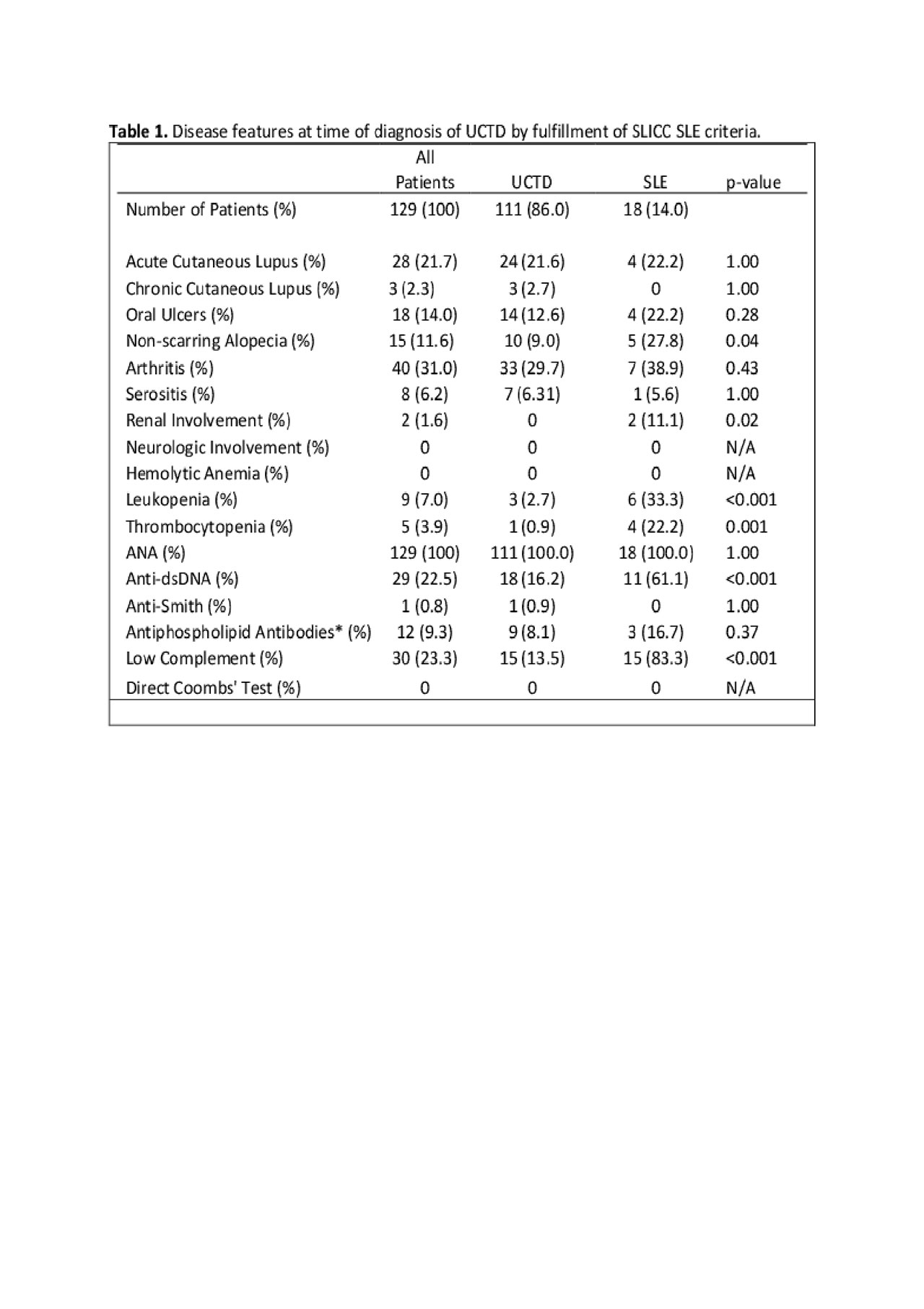Session Information
Session Type: Poster Session (Sunday)
Session Time: 9:00AM-11:00AM
Background/Purpose: Undifferentiated Connective Tissue Disease (UCTD) describes the clinical scenario where a patient demonstrates characteristics of a connective tissue disease but does not meet criteria for a defined CTD. The CTD that is most frequently implicated with UCTD is systemic lupus erythematosus (SLE). In recent years, new classification criteria for SLE have been developed. This study investigates the reclassification of UCTD patients using newly proposed SLE criteria.
Methods: Patients were identified within the Rheumatology and Arthritis Investigational Network (RAIN) database at the University of Nebraska Medical Center. Medical records of all patients were reviewed to confirm fulfillment of proposed classification criteria for UCTD: positive ANA, signs and symptoms of a CTD but not fulfilling the criteria for a defined CTD, and a disease duration of at least one year, including early UCTD. Characteristics at the time of diagnosis with UCTD were collected through medical record review and managed using the REDCap electronic data capture tool. The SLICC and ACR/EULAR criteria for SLE were applied at the time of diagnosis with UCTD. We then compared the proportion of patients reclassified as SLE according to these criteria as well as the specific disease features associated with reclassification as SLE.
Results: A total of 129 patients were included in the study. The majority of patients were female and white (90.7%), and the mean (SD) age at UCTD diagnosis was 43.5 (13.9). When applying the SLICC criteria, 18 patients (14.0%) were reclassified as SLE while 26 patients (20.2%) were reclassified using the ACR/EULAR criteria. Disease features which were associated with reclassification for both SLICC (Table 1) and ACR/EULAR criteria (Table 2) were renal involvement, leukopenia, thrombocytopenia, anti-dsDNA antibody, and hypocomplementemia. Non-scarring alopecia was associated with reclassification as SLE only under the SLICC criteria while the presence of arthritis was associated with reclassification as SLE under the ACR/EULAR criteria.
Conclusion: Both the SLICC and ACR/EULAR criteria exhibit increased sensitivity for SLE classification. The only disease feature associated with reclassification under the ACR/EULAR criteria but not the SLICC criteria was the presence of arthritis. Because arthritis is weighted heavily in this criteria (6 out of 10 points), it will reclassify many patients with this frequent manifestation as SLE.
*Includes anticardiolipin, lupus anticoagulant, anti-β2-glycoprotein
*Includes anticardiolipin, lupus anticoagulant, anti-β2-glycoprotein
To cite this abstract in AMA style:
Drehmel K, Erickson A, England B, Hearth-Holmes M. Applying Systemic Lupus International Collaborating Clinics (SLICC) and Provisional ACR/EULAR Systemic Lupus Erythematosus Classification Criteria in a Cohort of Patients with Undifferentiated Connective Tissue Disease [abstract]. Arthritis Rheumatol. 2019; 71 (suppl 10). https://acrabstracts.org/abstract/applying-systemic-lupus-international-collaborating-clinics-slicc-and-provisional-acr-eular-systemic-lupus-erythematosus-classification-criteria-in-a-cohort-of-patients-with-undifferentiated-connect/. Accessed .« Back to 2019 ACR/ARP Annual Meeting
ACR Meeting Abstracts - https://acrabstracts.org/abstract/applying-systemic-lupus-international-collaborating-clinics-slicc-and-provisional-acr-eular-systemic-lupus-erythematosus-classification-criteria-in-a-cohort-of-patients-with-undifferentiated-connect/


